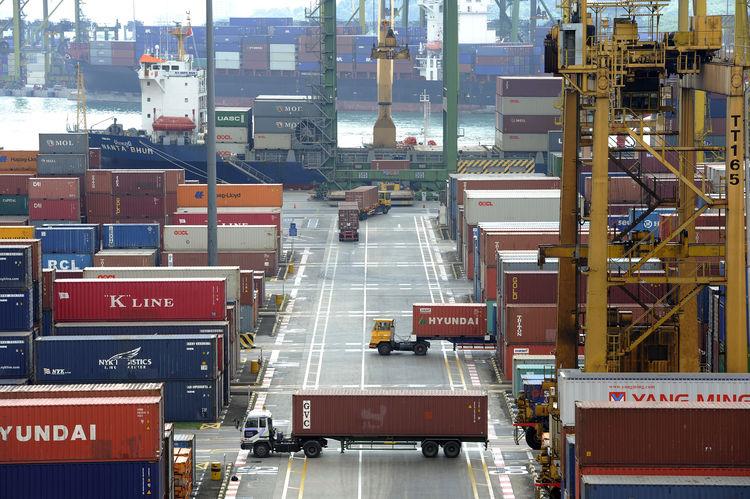- Experts Want Government to Engage Economists
From economists came a warning to the Federal Government to involve experts in the management of the economy, if it is serious about pulling the nation out of economic doldrums.
Essentially, the economists believe the government’s economic team lacked the necessary skill, to do what is required to build investors confidence in the country.
They decried the inability of the government to fashion out an economic blueprint to guide its actions and policies to stabilize the economy, warning that the country may be heading for the worse, if it continues with the present unclear and uncoordinated policies.
President of the Nigeria Economic Society (NES), Prof. Ben Aigbokan told The Guardian in an exclusive interview that “Until the Federal Government gives economists their pride of place in the supervision or management of the economy, most of government policies will not be able to deliver durable outcomes. It is about core competence not political appointments. Many of the actions of government, no matter how well intended, will be disjointed, unconnected together without an economic blueprint. And that is exactly what we have seen so far.”
He stated that having an economic team dominated by non-economists does not augur well for proper economic planning, saying since many members of the team headed by the Vice President, Prof Yemi Osinbajo are politicians, they tend to operated within limited horizon.
Head of Department of Economics, Ekiti State University, Dr. Taiwo Owoeye who lamented the lack of economic blueprint to rescue the economy from recessiuon, stressed that the Buhari government only prepared very well to win election, but there was no preparation for governance.
“It is also obvious that they did not have a full grasp of the economic challenges facing the country and how to confront it. And this is funny; funny in the sense that as at middle of 2014, everybody knew of the southward trend of the prices of oil, declining by the day from 140 or 120 dollar per barrel to about 40 or 60 dollars, that’s a signal for the in-coming government to brace up for the challenges,” he said
He asked the government to borrow a leaf from the Olusegun Obasanjo and Goodluck Jonathan governments, which had their own economic blueprints saying government must bring on board people who have understanding of the dynamics of modern economics.
Owoeye lamented that all the government has been talking about is the intervention promises of releasing money to stimulate the economy stressing that without any policy framework, the economy as being experienced now, will continue to lack direction.
“We don’t know where we are going now because there is no compass directing our movement. The whole thing boils down to the idea of Mr. President that the economy should not run itself because of the generation he belongs to. He believes in what economists call ‘Interventionist Tendency’, that is, the government should play a major role in the economy, as against the market forces playing the major role in the economy. That is why when we had the biggest crisis of exchange rate,” he maintained
He said it is unthinkable that that the economic team of a country will be dominated by lawyers. According to him, “Vice President Yemi Osinbajo was Attorney General of Lagos State, he was not the one giving economic direction of Lagos State when he was there. Udo Udoma, who is the Minister of Budget and Planning is also a lawyer, he has sat on the board of so many corporate bodies but that does not actually substitute for a core economic knowledge. The whole idea is that for you to act effectively well at that level, you need the core knowledge, training and exposure with international organisations, and those experiences do not come cheaply.
“And with due respect to the Minister of Finance, Mrs Kemi Adeosun, though she was trained as an economist but I don’t think she has enough experience to drive that office effectively well, being a Commissioner of Finance in Ogun State is not enough and her performance in office has not proved me wrong”
Another expert, Prof Ben Naanen of the University of PortHarcout said, without a blueprint, both foreign and local investors cannot know the direction of the economy adding that this accounted for the macroeconomic mistakes made by the Buhari government since it came to power.
Chieftain of Arewa Consultative Forum (ACF) and economist, Alhaji Idris Mikati said government should as a matter of urgency decide policy framework to pursue, stressing that “ Confused economic policy would not help us. Investors would like to have clear direction and not foggy weather.

 Naira4 weeks ago
Naira4 weeks ago
 Naira4 weeks ago
Naira4 weeks ago
 Travel4 weeks ago
Travel4 weeks ago
 Naira3 weeks ago
Naira3 weeks ago
 Jobs4 weeks ago
Jobs4 weeks ago
 Naira4 weeks ago
Naira4 weeks ago
 Investment4 weeks ago
Investment4 weeks ago
 Travel4 weeks ago
Travel4 weeks ago


























